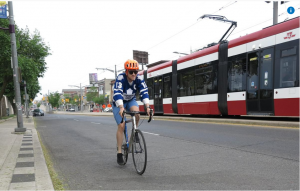Toronto vs. Montreal — on the ice and in the bike lane
 The rivalry between Toronto and Montreal is heating up, on the ice and in the bike lane. Last week, Mayor John Tory bet his counterpart Valérie Plante that our Maple Leafs would beat the Canadiens in this year’s playoffs. If Plante loses, she might considr challenging Tory on bike lanes.
The rivalry between Toronto and Montreal is heating up, on the ice and in the bike lane. Last week, Mayor John Tory bet his counterpart Valérie Plante that our Maple Leafs would beat the Canadiens in this year’s playoffs. If Plante loses, she might considr challenging Tory on bike lanes.
For decades, Montréalers have taunted us with their hockey superiority, but they could also chirp us for our inferior bike lanes. Since 1967, when Toronto last won the Stanley Cup, Montreal has 10 cups while building twice as many bike lanes.
Why have we fallen so far behind in Stanley Cups and bike lanes? Two reasons: poor management and a failure to follow through on plans.
With the 1970s “Bicycle Revival” cyclists got a new lease on life, especially given the fitness boom and a new environmental awareness. If you were a Maple Leafs fan, the 1970s (and 1980s) were a good time to be cycling.
Both cities quickly recognized the shortage of safe places to ride a bicycle. In 1976, Toronto council approved a slate of bike lanes, but decided that more study was needed. In the 1980s, zero bike lanes were installed, based on the American wisdom of the day that cyclists should be integrated with other road traffic. By contrast, Montreal, following the European model, started building bike lanes.
In the 1990s, things were looking up for our hockey team and our bicyclists. In 1993, the Leafs very nearly made the Cup finals but for a missed high-sticking penalty call against Wayne Gretzky. In the same year, Toronto approved nine kilometres of bike lanes (in a city a fraction of its current size). Oh yeah, and Montreal won the Cup.
By 2016, Montreal was far ahead in Stanley Cups (24-13) and in bike lane kilometres (260-130), but Torontonians had cause for optimism. The Leafs drafted phenom Auston Matthews, and the city drafted an expensive new bike plan. Matthews took jersey number 34 — precisely the annual kilometres of new bike lanes outlined in the plan. Mayor Tory assured us that the bike plan would be achieved. Matthews delivered (averaging 40 goals per year); the mayor didn’t (a mere 7 km of new bike lanes per year).
Despite progress in 2020, Toronto City Hall appears inclined to return to its old ways, planning only 12 km of bike lanes this year.
Torontonians are as passionate about their team as Montréalers, but it’s time we match our rival’s passion in creating safe roads for people on bikes.